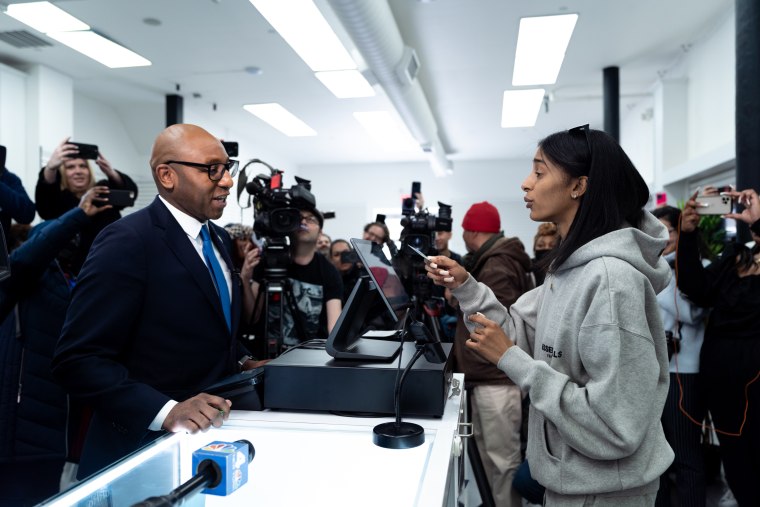The opening of Good Grades cannabis dispensary in Queens, New York, on Thursday made many historic firsts. Among the first six retail dispensaries in New York state, it is the first to open in Queens and the first woman-owned dispensary to be financially supported by the state’s social equity investment fund.
But co-owner Michael James Jr. said the shop’s first customer provided a “pivotal moment” for the start of the business.
Queens Borough President Donovan Richards made the first purchase from the shop on Jamaica Avenue.
“It was very ideal, and I think it killed a lot of stereotypes,” Extasy James, the shop’s other co-owner, said Monday. She said Richards bought gummies.
The grand opening of the storefront in Jamaica’s storied shopping hub was “unbelievable” and “high-energy,” Extasy James said.
“It was so refreshing, and it was so fulfilling, and it was rewarding,” she said. “I also felt a lot of love, and that’s more important. Not just from family and friends, but also from the staff, from security, from everyone.”
The opening was supported by the New York State Social Equity Cannabis Investment Fund, a public-private partnership providing renovated retail locations. Good Grades opened first as a temporary pop-up, allowing time to train employees and generate capital. It will then close for final construction and reopen for the long term, New York Gov. Kathy Hochul said in an announcement.
The James cousins got their license through the state’s Conditional Adult-Use Retail Dispensary license program. The program was created to address those most affected by marijuana prohibition; only justice-involved people — those who were previously convicted of marijuana-related offenses — and their family members can apply.
As an attorney and a legal advocate for minority business owners, Michael James first helped his clients apply for the license. But because of other family members who have faced the criminal legal system, including Extasy James’ father, who was deported for a cannabis offense, Michael James discussed applying with his family and decided to apply with his cousin.
Marijuana “goes from, you know, being literally a tool to overpolice our communities to now a tool of economic prosperity,” he said. “The window of opportunity for poor, Black and brown communities, minority communities, to now benefit from it is just substantial.”
The dispensary is a big change for the neighborhood. At the center of three police precincts (the 105th, the 103rd and the 113th), Jamaica, a largely African American and Latino community, had historically faced disproportionate cannabis criminalization until recreational cannabis was legalized in 2021.
The 113th Precinct, a predominantly Black and Afro-Caribbean section, in particular faced high levels of cannabis criminalization over the years compared to other New York City neighborhoods, according to a 2018 report by the office of the Manhattan district attorney using data analyzed by Politico. In South Jamaica, there were 281 marijuana complaints and 280 arrests, compared to 136 complaints but only 56 arrests in the 84th Precinct, which includes whiter, wealthier neighborhoods like Brooklyn Heights and Boerum Hill, according to the report.
Racial disparities in marijuana arrests were also apparent within Queens neighborhoods; in 2018, Blacks and Latinos accounted for 71% and 80% of cannabis-related arrests in Flushing and Forest Hills respectively, even though Black and Latino residents account for only 20% of the population in those areas, the report showed.
Extasy James said that as she was growing up in the Bronx and visiting family in Queens, she observed families being broken up because of marijuana-related arrests.
“There’s a lot of families, even grandmas and grandpas, where they didn’t make enough money,” she said. “So they would sell cannabis on the side, and they would get in trouble. A lot of families would be deported, and it just broke up a lot of homes.”
Michael James said opening the dispensary near his childhood home felt surreal.
“I lived five minutes away. My father had a business here,” he said. “I watched businesses on this same avenue for years. I know it like the back of my hand. So it’s really full circle. This feels like where we’re supposed to be.”
Michael James said that, as a family business, the dispensary hopes to give back to the community by educating consumers and partnering with local nonprofit groups to host giveaways and community drives.
“We really just want to be a role model in his community,” he said. “We really do, and we want to just set the standard.”
Extasy James said the opening presents a message of inspiration, not only for her family, but also for the community.
“We want to inspire the community that there are second chances and that dreams can come true,” she said. “Anything is possible.”
